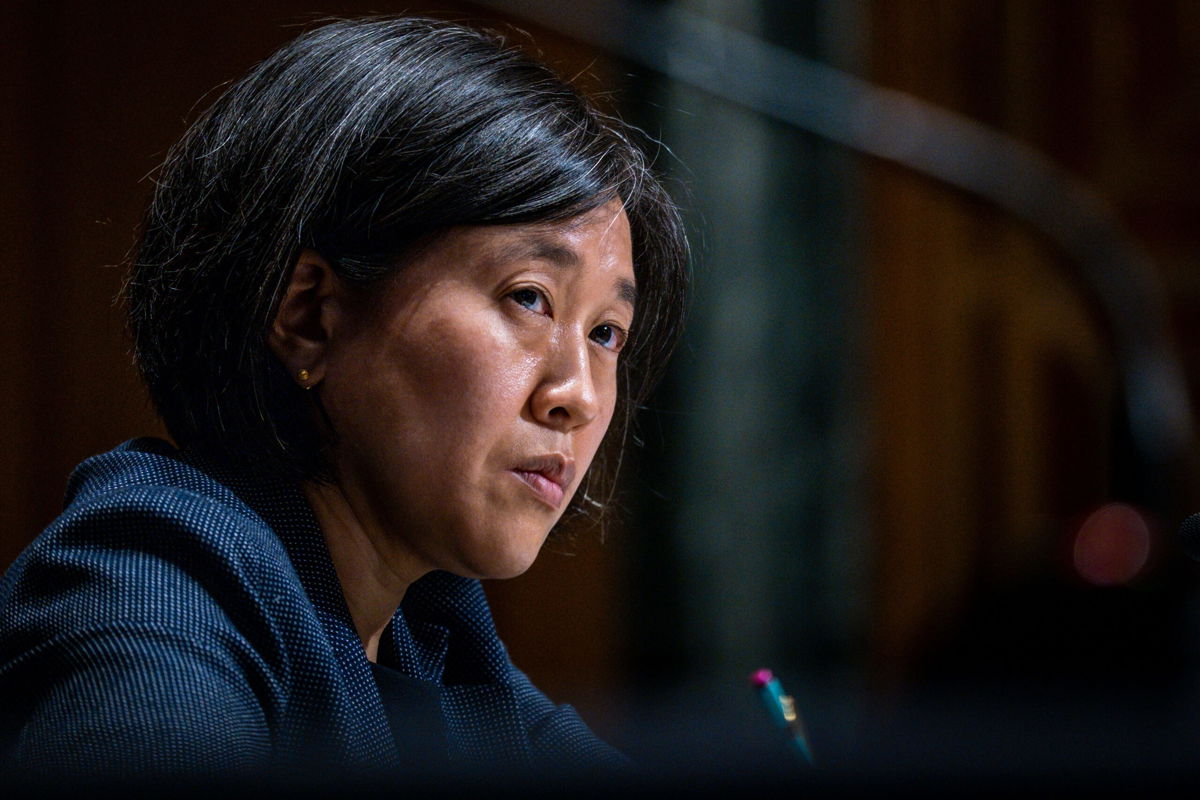US Trade Rep Katherine Tai to condemn China’s ‘unfair trade practices’

US Trade Representative Katherine Tai is expected to condemn China's "unfair trade practices" during remarks at the Center for Strategic and International Studies in Washington
By Donald Judd, CNN
US Trade Representative Katherine Tai is expected to condemn China’s “unfair trade practices” during remarks at the Center for Strategic and International Studies in Washington, DC, on Monday, according to a senior administration official.
Tai will cite examples of how practices have allegedly “hurt our workers and our industries” and “given Beijing an unfair advantage in the global trading system,” the official told reporters Sunday. The official added that though “our objective is not to escalate trade tensions with China,” Tai will also “point to China’s failure to reform its non-market policies or follow through on the commitments it made during high-level dialogues with US officials over the last 15 years.”
“For too long, China’s lack of adherence to global trading norms has undercut the prosperity of Americans and others around the world,” Tai will say, according to prepared excerpts of her remarks provided to CNN by the United States Trade Representative’s office. “Unlike the past, this administration will engage from a position of strength because we are investing in our workers and our infrastructure.”
Tai confirmed in August during a virtual meeting with the US Chamber China Center Advisory Board that the administration was conducting a comprehensive review of US-China trade policy. She is expected on Monday to call for a new strategy “that aligns with the priorities of our workers and businesses” in relations with China moving forward, the official said.
The official added that the US Trade Representative (USTR)’s office will begin “a targeted tariff exclusion process,” while also pledging to “keep open the potential for additional exclusion processes in the future” on certain sectors of the economy. Tai will advocate Monday for re-examining tariff exemptions in a way that “optimally serves our economic interests,” per her prepared remarks. The US will also “revisit” what’s known as the Phase One agreement with China, which former President Donald Trump signed in early 2020, and “emphasize that China must follow through on the commitments made,” while resuming direct negotiations with Tai’s Chinese counterpart, Vice Premier Liu He.
The Biden administration’s decision to explore exceptions to Trump’s tariffs on China comes as many in the manufacturing sector have called on the USTR’s office to ease or lift the duties, citing supply-chain shortages. There are currently tariffs most goods being shipped from China into the United States, including items like baseball hats, luggage, bicycles, TVs, sneakers and a variety of materials used by American manufacturers. The average rate is 19% — more than six times higher than before the US-China trade war began in 2018, according to the Peterson Institute for International Economics. Importers pay those tariffs and generally pass along some or all the increased cost to consumers.
Still, another official acknowledged some bright spots in the Phase One agreement, including provisions that helped US farmers, who suffered during the trade war.
“President Biden is going to continue doing things that … (create) more predictability for American industry and allows them to plan and grow,” the official told reporters. “But unlike his predecessor, President Biden is going to hold China to account where China is falling short of its commitments. Biden also believes that we have to use all our tools to make sure China’s economic trade policies do not hurt American workers and businesses.”
Tai will reiterate the US’ plan to defend itself “from state-directed industrial policies that harm our workers, producers, and overall economic interests,” according to the first official, pointing to additional partnerships with allies, including June’s settlement between the US and EU over subsidies to Airbus and Boeing.
The Biden administration’s steps to hold China to account come on the heels of last month’s call between Biden and Chinese President Xi Jinping, which saw the two leaders commit to “maintaining open lines of communication.” The first official told reporters Sunday that those calls have continued, “including at both the leader level as well as the officials that they empower.”
The-CNN-Wire
™ & © 2021 Cable News Network, Inc., a WarnerMedia Company. All rights reserved.